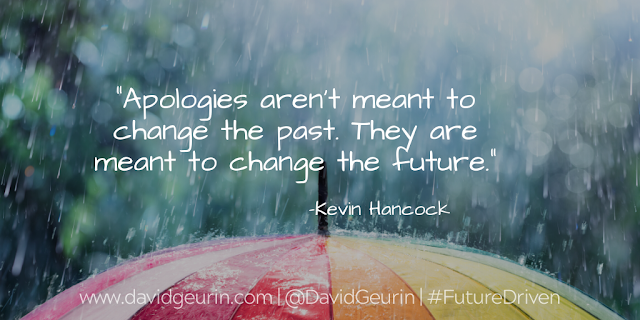Friday, January 31, 2020
7 Benefits of Apologizing to Your Students
No one is perfect. Not one of us. But if we're not careful, we can fall into the trap of thinking we have to act perfect.
I find it puzzling how students sometimes have the idea that teachers/principals/educators are somehow above making mistake or should be above making mistakes.
I remember when I was teaching 9th grade English how students would jump at the chance to point it out if I misspelled a word on the white board, as if I was suddenly an incompetent teacher. They would express shock and dismay that I would make such a mistake.
But without question, I made my fair share of mistakes, and I learned that it was best to admit them and help dispel the myth that teachers don't make mistakes.
But a bigger issue than spelling errors is how we show up in our relationships with our students. And guess what, we're still imperfect. We make mistakes in how we treat others sometimes too. And when we do, the right thing to do, and the most effective thing to do, is to admit our mistakes and apologize for them.
As a principal now, I try to model apologizing to our staff and to our students when I don't meet the mark. I've made more than my share of mistakes. It might be a small thing or it might be something bigger. It might have been overlooked or there might be hurt feelings. Regardless, it's hard to go wrong with a sincere apology.
Here are 7 reasons to apologize or express regret...
1. Shows You're Human
Kids sometimes think their teachers are above making mistakes. But kids need to know we're human too. We are doing the best we can, and we're going to make mistakes. Positive human behavior involves admitting mistakes.
2. Creates a Healthy Example
When students see us apologize and show regret for our actions, it helps them feel more confident to do the same. We get a clearer picture of how things really are when we are honest about our mistakes.
3. Shows Ownership of a Mistake
Students will be more likely to take risks if they know the teacher admits and takes ownership of his or her own mistakes in this classroom.
4. Builds Connection
When you admit mistakes, it makes your relationships stronger because students feel they can trust you.
5. Increases Your Influence
Some people fear admitting a mistake because they think other people will use it against them. But the opposite is usually true. When we admit mistakes, we appear smarter, more confident, and more sincere and that creates allies.
6. Shows You Care
People who won't admit mistakes are often self-focused and want to protect themselves rather than show they care about others. Admitting a mistake is a selfless decision.
7. Develops a Growth Mindset
When you have a growth mindset, you view mistakes as part of learning. Admitting a mistake and apologizing for it, if it hurt someone, is important to be able to move past it and learn from it.
How do you feel relationships are made stronger by apologizing? Can you apologize too much? I want to hear from you. Leave a comment below or respond on Facebook or Twitter.
Subscribe to:
Post Comments (Atom)

No comments:
Post a Comment